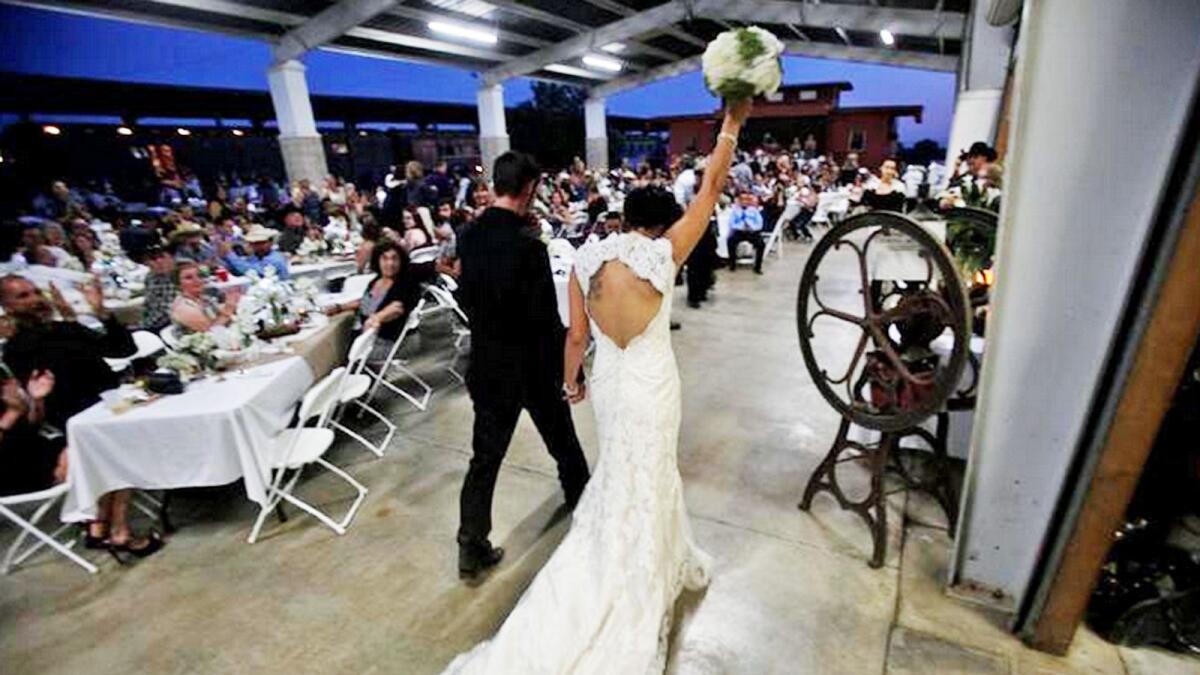Study: To boost your odds of a successful marriage, have a big wedding

- Share via
To improve your odds of a high-quality marriage, try not to have too many sexual partners before you meet “the one.” And when you do find him or her, consider inviting at least 150 people to your wedding.
That’s just some of the practical advice offered by a pair of psychology researchers from the University of Denver who have studied 418 people who participated in the Relationship Development Study. All of them were single and between the ages of 18 and 40 when they joined the study in 2007 and 2008, and all of them had tied the knot by the time the researchers checked in with them five years later.
The goal was to identify patterns of behavior that tended to set people up for successful and fulfilling marriages. The researchers asked study volunteers questions about “marital happiness, confiding in one another, believing things are going well in the relationship, and thoughts of divorce,” according to their report published this week. Those who ranked in the top 40% were considered to have “high-quality marriages.”
The researchers — Galena Rhoades and Scott Stanley — emphasized that the choices men and women make long before they say “I do” seem to have a strong influence on their marriages years later.
“What happens in Vegas doesn’t stay in Vegas, so to speak,” they wrote. “Our past experiences, especially when it comes to love, sex, and children, are linked to our future marital quality.”
For instance, the study volunteers were asked how many sexual partners they had before they got married, and the response (on average) was five. But 23% of them had slept only with the person they married, and they scored higher on the marriage quality test than those who had more experience. In fact, for women, the higher the number of sexual partners, “the less happy she reported her marriage to be,” according to the report.
People who had already been through a divorce or who had lived with someone before meeting their current spouse were also less likely to have a high-quality marriage. The researchers found that 35% of these people earned that designation, compared with 42% of those who had only lived with their eventual spouse.
What’s wrong with having a past? “More experience may increase one’s awareness of alternative partners,” Rhoades and Stanley wrote, and “a strong sense of alternatives is believed to make it harder to maintain commitment to, and satisfaction with, what one already has.”
There’s also the fact that people who have more ex-significant others have been through more breakups. “A history of multiple breakups may make people take a more jaundiced view of love and relationships,” they added.
The researchers also noted that 24% of the people in the study either had children from a prior relationship by the time they tied the knot or married someone who did. “There is no question that raising children from prior relationships can add stress to a marriage,” the researchers wrote.
Couples that took relationship milestones seriously were more likely to have high-quality marriages compared with couples that merely stumbled into things. For instance, 32% of the study volunteers said their relationship with their husband or wife began with a casual hookup. Among these folks, 36% had a high-quality marriage, compared with 42% of those who took things more slowly.
Likewise, among couples who moved in together before “making a commitment to marry,” only 31% had a high-quality marriage, the researchers reported. That compares with 43% of couples who decided to live together only after agreeing that they were on a path to marriage.
You might think that cohabitation before marriage would improve one’s chances for a successful marriage, since it gives couples time to adjust to the realities of living together. But Rhoades and Stanley theorized that once men and women had meshed their finances, furniture and pets, the effort required to get out of a less-than-ideal relationship was simply too great.
“Some may therefore slide into a marriage that they would have otherwise avoided,” the researchers wrote. A safer way to test a relationship would be to take a trip together or meet one another’s families, they added.
Even worse than casually moving in together before marriage was having a child together before marriage, at least for those who had graduated from college. Only 3% of college-educated couples who had a baby before they got married had a high-quality marriage. That compares with 44% of college-educated couples who had not yet had a child together.
Finally, there’s the matter of the wedding itself. Among the 418 study volunteers, 11% did not have a formal wedding ceremony, and only 28% of these couples had a high-quality marriage. Meanwhile, 41% of couples that did have formal weddings achieved high-quality marriage status.
The researchers speculated that “couples who are struggling or less happy in their relationship may be less likely to want to celebrate getting married.” They also noted that “the act of having a public ceremony ... symbolizes a clear decision to commit to one’s marriage.”
Apparently, the larger the guest list, the bigger the statement. The researchers found that 47% of couples that got hitched in front of 150 or more guests had high-quality marriages, compared with only 31% of those who had 50 or fewer guests. That means that couples who had big weddings were 52% more likely to have high-quality marriages than couples who had smaller weddings.
(In case you were wondering, 37% of the couples who had medium-sized weddings went on to have high-quality marriages.)
How could this possibly matter? “There is some reason to believe that having more witnesses at a wedding may actually strengthen marital quality,” the researchers wrote. People want to keep the promises they make in public, so the bigger the crowd, the greater the pressure, this thinking goes.
For those who are already married and can’t go back in time to rewrite their relationship history, Rhoades and Stanley have some encouraging words: “No one is doomed to an unhappy marriage.” It’s never too late for couples to make deliberate decisions about important milestones instead of simply sliding into them. Talking openly about how past experiences shape your current views can help as well, they wrote.
The Relationship Development Study was funded with a grant from the National Institute of Child Health and Human Development, part of the National Institutes of Health. The new report was published by the National Marriage Project at the University of Virginia.
For more stories about scientific research, follow me on Twitter @LATkarenkaplan and “like” Los Angeles Times Science & Health on Facebook.







